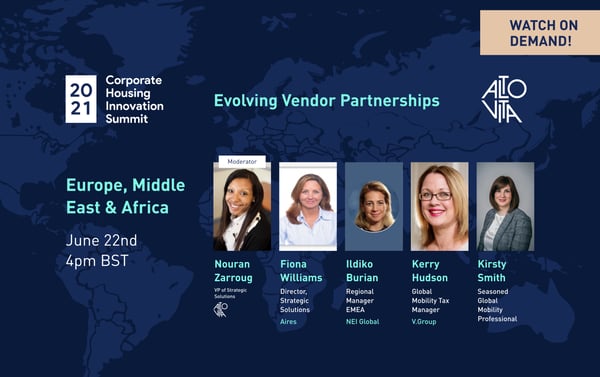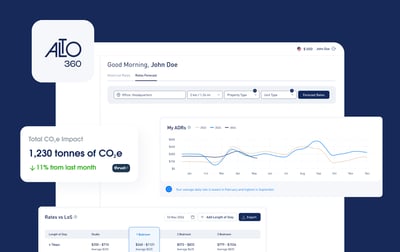

The Innovation Summit continued on Tuesday, March 22 with Day 2, where we (virtually) travelled across the pond to Europe, Middle East & Africa. EMEA Ambassador and AltoVita VP of Strategic Global Partnerships Nouran Zarroug led a panel on Evolving Vendor Partnerships, joined by industry leaders from corporate and relocation management realms:
- Fiona Williams, Director of Strategic Solutions at Aires
- Ildiko Burian GMS, Regional Manager EMEA at NEI Global
- Kerry Hudson, Global Mobility Tax Manager at V.Group
- Kirsty Smith, Seasoned Global Mobility Professional 10+ Years Experience
Watch the Recording
Introducing AltoVita’s Public API
Vivi Himmel, AltoVita CEO & Co-Founder, conducted a live product demo of one of the five new features built as a result of the Innovation Summit: AltoVita’s Public API.
This revolutionary public API will allow relocation partners to connect to AltoVita’s B2E property management system, giving them access to a global network of 1 million vetted and verified properties across 165 countries and 956+ cities. Clients can then seamlessly initiate housing requests, extend bookings, and cancel reservations.
Introducing AltoVita’s Data Analytics Tool
Then, Vivi demo’d a second new feature built during the Innovation Summit: the Data Analytics Tool.
“The information is quite literally at your fingertips with this.” – Kerry Hudson
This easy-to-use tool allows clients to see the average room night price in any city sorted by the number of bedrooms. The volume of the data is represented, and also allows clients to see price changes for seasonality. Data can be represented in both graphical and tabular formats. The tool is currently available to clients in Beta as our development team continues to refine and enhance the features – for instance, soon clients will be able to download reports to PDF for easy sharing and forecasting.
This grants Corporates, Relocation Management Companies (RMCs) and Destination Service Providers (DSPs) the ability to benchmark, budget for accuracy, educate and manage client expectations, and be a helpful parity feature.
Key Takeaways from the Panel
“This is exactly the kind of inter-management partnership of the future. We talked about building that ecosystem, and then when your vendor partners have this kind of technology that can give us the information right at our fingertips to help people like Kirsty and Kerry with their projects, their moves and we can come back to them the same day because we have that information, it’s absolutely brilliant. It’s definitely the future.” – Fiona Williams
Communication
The pandemic and subsequent global lockdowns brought along with it a myriad of challenges for all, this was certainly felt in the Global Mobility arena. Vendor/Client relationships needed to quickly pivot to digital and virtual settings in order to keep things moving and support assignees across the globe. At this session, the panelists collectively agreed that very frequent and transparent communication was the key to success. This was executed through zoom calls, regular calls, emails, Slack, etc. Most agreed that the lack of in-real-life face time did not hinder efforts due to so many organisations making themselves remote and agile very quickly.
Kerry described her particular industry (shipping) as extremely busy during the pandemic, so being involved in the team that was coordinating quarantine, testing, and vaccinations for thousands of workers required working extremely closely with a large number of individuals to pull off a mammoth task.
Managing Expectations: Cost vs Service
The sector is frequently being squeezed on the price of services, so it was insightful to hear that the in-house corporates are also being put under immense pressure from senior leadership and procurement teams who are all looking for cost savings due to significantly reduced revenue during the pandemic. The key here is for the Global Mobility Manager and the Vendor to work more closely together on these projects to continue to educate one another and the business on where savings can be made and where we need to ‘push back.’ Talent acquisition and retention remains a major issue for many tech companies, so pushback is required at times.
It was agreed by all the panelists that vendors need to take a more consultative approach with their clients, offer suggestions for specific areas for cost savings for example if a particular benefit within the policy was not being utilised and offering up advice on where investment must be made.
Ecosystems & APIs
In-house corporates have to manage multiple systems and navigate a number of portals to access information and data with different vendors. We spoke about the dream ‘future state’ where APIs can be built across Vendor ecosystems, so corporate clients can quickly and seamlessly access broad information at their fingertips. This can then empower all manner of decision-making around costs, policies, benefits, and help elevate the conversations.
Different Perspectives
Kirsty offered a more unique perspective in that she has previously been on the vendor side and has now transitioned into an in-house corporate role. She explained this gave her insight into what is possible and what can be achieved when we collaborate fully with one another.
The Role of Data
Data is becoming increasingly important and both sides of these crucial partnerships require it in order for us all to become better allies. Additionally detailed data analytics can help support the various arguments around ‘service vs cost.’
“Technology is really the forefront going forward, and making sure those platforms are integrated, since that’s definitely a pain point a within the industry. When there are multiple platforms and multiple different forms, I know that can be quite frustrating. More integrated ecosystems will save a lot of time and a lot of energy moving forward.” – Kirsty Smith
Biggest Takeaway
What was clearly identified from this fascinating session, was that we cannot progress and be successful without first realising we have a mutual goal and secondly realising that further collaboration from all sides is paramount. We as a sector must continue to come together and have regular conversations (sometimes difficult ones) around the challenges, trends, learnings, etc. Additionally, we must ensure that these discussions involve a diverse set of skills, disciplines, and roles to ensure we can access the full picture i.e Global Mobility Manager, Procurement manager, the RMC, Tax and immigrations provider, etc. All panelists have said they look forward to having more conversations of this type!
“The only constant in life is change. As long as we can turn these changes into our benefits and into the client’s benefit by adopting, enhancing, and improving, the better. We also cannot ever underestimate the soft skills: the listening, the speaking, the communications, and definitely the feedback from clients will make things move forward.” – Ildiko Burian
Previous Article
Product Launch Day 1: US East Coast & Central
Next Article

